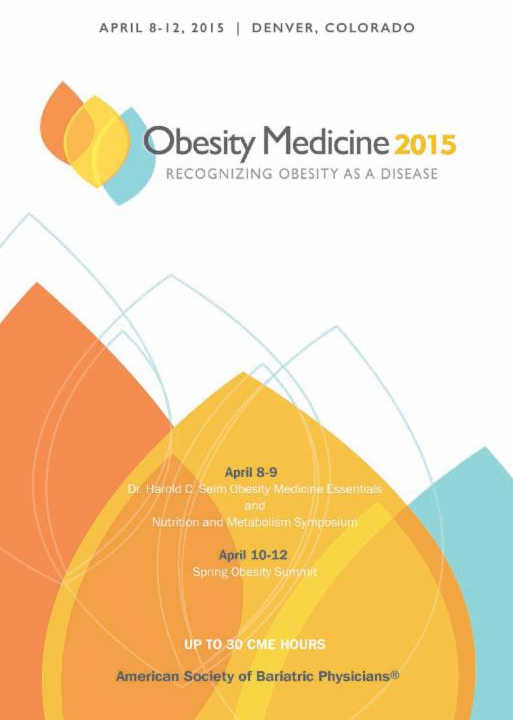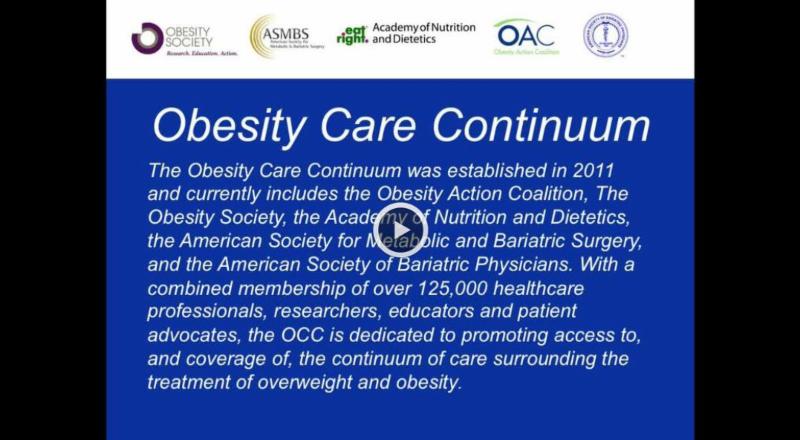|
Contact Us
| |
Bariatric Physicians
2821 S. Parker Road
Ste. 625
Aurora, CO 80014
303.770.2526 | asbp.org
Staff
Laurie Traetow, CAE, CPA
Executive Director
laurie@asbp.org
Beth Amelon
Sponsorships & Exhibits Coordinator
beth@asbp.org
Carly Crosby
Meeting Planner & Executive Coordinator
carly@asbp.org
Marcie Gonzales
Receptionist
marcie@asbp.org
|
|
|
|
Obesity Medicine e-Weekly
|
News
 Conference preliminary program now available Conference preliminary program now available
The preliminary program for Obesity Medicine 2015 is now available online. Look for the hardcopy version to arrive in your mailbox shortly. The preliminary program contains a preview of the conference schedule, including course content, speakers, and after-hours events. View the preliminary program, learn more about Obesity Medicine 2015, or register online for the conference.
 What 2,000 calories looks like What 2,000 calories looks like
 Dr. Arya Sharma to conduct upcoming webinar Dr. Arya Sharma to conduct upcoming webinar
Arya Sharma, MD, PhD, FRCPC, is a renowned obesity expert. He is the medical director of the Edmonton Regional Bariatric Program and the founder of the Canadian Obesity Network. During his upcoming talk for the ASBP Advanced Curriculum Fellowship (ACF) Program, Dr. Sharma will discuss the Edmonton Obesity Staging System. While the webinar is only available to ACF Program participants, enrollment in the ACF program is open to all ASBP members. Learn more about enrolling in the ACF program.
 First Obesity Basic Medical Treatment course only a few days away First Obesity Basic Medical Treatment course only a few days away
Do you have a colleague in the D.C. area who doesn't currently practice obesity medicine but is interested in doing so? Tell them to register for Obesity Basic Medical Treatment. There's still time to register for the course in Washington, D.C., on Jan. 31. This newly revised course introduces the different treatment options available to patients affected by obesity and provides an idea of how to approach obesity treatment. Learn more about this course. Not in the D.C. area? See a list of all 2015 dates and recommend a course in a city near you!
|
Featured Member
Get to know your fellow ASBP members! Each month, we'll feature an interview with an ASBP member to help you learn more about your obesity medicine colleagues. This month's featured member is Dr. Harold Bays, the medical director and president of the Louisville Metabolic and Atherosclerosis Research Center and a coauthor of the Obesity Algorithm®, presented by ASBP.
 Q&A with Harold Bays, MD, FTOS, FACE, FNLA Q&A with Harold Bays, MD, FTOS, FACE, FNLA
1. How long have you been working in obesity medicine, and how did you get started in obesity medicine? My start in obesity medicine began as a freshman in high school. I did well with mathematics, and later even taught myself some computer code during the DOS era. I was driven to be self-sufficient; in addition to school activities, I worked almost fulltime as a busboy, dishwasher, cook, and ultimately midnight janitor. Regarding body weight, I surmised that if I committed to forever cutting-out one energy-dense food once a week, and if I engaged in routine physical activity (which being from rural Kentucky, meant some bowling, and lots of basketball), then I would likely lose weight. This was my first successful start in obesity medicine. Since then I have served as an investigator for more than 400 clinical trials, authored/co-authored more than 200 manuscripts in peer review journals, and presented hundreds of abstracts at scientific meetings.
2. What excites you most about the field of obesity medicine right now? Most recently, I am intrigued of the possibility that the dramatic increase in obesity and its adiposopathic consequences in just the past few decades substantially involves epigenetic factors. It seems unreasonable to posit introduction of some sudden new gene additions or gene deletions in the past 30 years. Biology doesn't work that way. I am also suspect that extragenetic nutritional patterns or physical activities are dramatically different now, compared to the "Flock of Seagulls" days of the 1980s. Epigenetic effects may hold the key. This is important because it suggests that just as we have witnessed a rapid increase in the obesity epidemic, it may also be possible to reverse this process in an equally dramatic and timely way via aggressive improvements in pre-, peri-, and post-natal nutritional management, especially among individuals who are overweight or obese. That possibility is exciting to me.
3. What advice would you offer to clinicians who are new to the field of obesity medicine? Download the Obesity Algorithm.
4. What was your role in creating, and more recently, updating, the ASBP Obesity Algorithm? I was a coauthor, and writer of the ASBP Obesity Algorithm. My role was to herd cats, fight windmills, and avoid the stress-induced regain of the weight I lost in high school.
5. What are your favorite ways to spend your days off? Due to many travel, scientific, research, business, and publishing commitments, I do not have time off. I work every day of the year. This can be verified by my Obesity Algorithm coauthors who received so many of my calls and emails over weekends and holidays (e.g., Thanksgiving, Christmas, etc.).
6. Say in five years, a major film production company decides to make a movie about the development of ASBP's Obesity Algorithm. What actor would you want to portray you and why? I would play myself. For about 10 years, I previously worked as a national touring stand-up comic. I was known as the "Only Stand-Up Endocrinologist in the World." (I don't know if this was actually correct; I did not conduct any formal survey. But I think it was accurate.) Comedians have often done well in acting roles. An additional advantage would be that I would not have to ask the director: "What's my motivation?" I would already know.
|
Resources
 The Obesity Treatment Foundation (OTF) helps keep you up to date on current obesity research! Each week, OTF publishes a brief overview of three recent studies so you can be in the know, even during your busiest days. Click the titles below to view the full articles, and please consider supporting OTF so we can continue to provide you with updates on the latest research. The Obesity Treatment Foundation (OTF) helps keep you up to date on current obesity research! Each week, OTF publishes a brief overview of three recent studies so you can be in the know, even during your busiest days. Click the titles below to view the full articles, and please consider supporting OTF so we can continue to provide you with updates on the latest research.
MacLean, P. S., et al. Obesity Reviews, 2015.
This review article by Dr. Paul MacLean summarizes the effects that dieting has on adaptations in the homeostatic system that controls body weight. He suggests that weight loss awakens the body's defense system in a manner that is persistent, redundant, and intent on the objective of restoring the body's depleted energy stores. Successful, long-term weight loss should address these strong biological forces and counter them with environmental, behavioral, pharmaceutical, or other interventions. Dr. MacLean suggests that effective interventions that prevent weight regain will need to be as comprehensive, persistent, and redundant as the biological adaptations they are attempting to counter.
Ryua, J. Y., et al. Metabolism, 2015.
Much attention has recently been paid to the association between sleep duration and obesity. Sleep duration and quality can significantly affect appetite, food intake, and energy balance. This study investigated the association between body size and sleep duration after adjusting for potential confounding factors in more than 9,000 Korean adults. The analysis found that individuals with obesity had significantly shorter sleep durations than individuals without obesity, regardless of confounding factors, such as age, gender, smoking status, alcohol consumption, physical activity, income, and education. Sleep duration should be addressed with individuals affected by obesity.
Using real-world data to evaluate the association of incretin-based therapies with risk of acute pancreatitis: A meta-analysis of 1,324,515 patients from observational studies
Wang, T., et al. Diabetes Obesity Metabolism, 2015.
Type 2 diabetes (T2D) is a common condition in people affected by obesity. Incretin-based therapies (IBTs) are often used to treat T2D, but acute pancreatitis (AP) is a severe and potential complication associated with these therapies. The evidence for this association in a real-world setting, however, is inconsistent. Ten studies that included 1,324,515 patients were reviewed to estimate the odds ratio for an association between IBTs and AP. The researchers found that the real-world data analyzed does not suggest an association of AP with IBTs. This finding advises that IBTs are a reasonable option for T2D, and although occurrence of AP should be monitored, it does not appear that there is an increased risk.
|
Advocacy

Webinar: Learn what the Obesity Care Continuum accomplished in 2014
The Obesity Care Continuum (OCC)--comprised of ASBP, the Academy of Nutrition and Dietetics, the American Society for Metabolic and Bariatric Surgery, the Obesity Action Coalition, and The Obesity Society--is dedicated to promoting access to, and coverage of, the continuum of care surrounding the treatment of overweight and obesity. Watch a new video by ASBP Washington Representative, Chris Gallagher, explaining OCC's advocacy initiatives and accomplishments in 2014.
|
Education

 Register now for the highly anticipated spring conference Register now for the highly anticipated spring conference
- Full Conference
30 CME | April 8-12
Includes the Spring Obesity Summit and your choice of either Obesity Medicine Essentials (register) or the Nutrition and Metabolism Symposium (register). - Dr. Harold C. Seim Obesity Medicine Essentials
12.75 CME | April 8-9 | Register
Gain practical knowledge in this how-to series about the medical care of patients affected by obesity. - Nutrition and Metabolism Symposium
12.75 CME | April 8-9 | Register
Broaden your understanding about a range of diet and nutrition options based on scientific research. - Spring Obesity Summit
17.25 CME | April 10-12 | Register
Enhance your knowledge about the latest scientific research and trends related to the evaluation and treatment of patients affected by obesity.
Want more? Save the date for Overcoming Obesity 2015: Diagnose. Personalize. Treat. in Washington, D.C., from Sept. 30-Oct. 4, 2015.
  Obesity Basic Medical Treatment course registration now available Obesity Basic Medical Treatment course registration now available
Do you know anyone who wants to learn the basics of medical obesity treatment but doesn't know where to start? The Obesity Basic Medical Treatment (OBMT) course teaches physicians and health care providers who are brand new to the field of obesity medicine about the basic approaches to obesity treatment. Attendees can then decide whether or not to pursue further obesity medicine education or understand when to refer a patient to an obesity medicine clinician. Learn more about this course, or download a printable registration form. Online registration is also available for the following dates and cities.
|
|
|
|
|